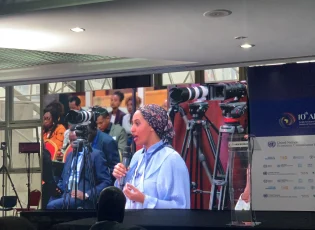"Challenges Facing Democratic Path in the African Continent": A New Report by Maat Monitoring Elections in Africa during 2023
Okeil: 2023 witnessed a variation in achieving democracy indicators in the African continent
Islam Fawky: Many African countries have taken steps towards a more democratic future despite the challenges they face
Maat for Peace, Development, and Human Rights has released a comprehensive report titled "Elections in Africa Throughout 2023: Challenges Facing Democratic Path in the African Continent". This report focuses on monitoring and analyzing the elections that were scheduled to take place on the African continent in 2023, including presidential, legislative, and local elections. It provides insights into each country's readiness for conducting the electoral process, measures the participation rates, and examines the impact of challenges on the integrity of these elections.
According to the report, elections were expected to be held in 24 African countries. However, some countries faced significant challenges that hindered the timely execution thereof. Ultimately, 21 countries successfully held their elections, representing 87% of the total countries scheduled to hold elections. Unfortunately, three countries—Libya, Togo, and Guinea—were unable to conduct their elections, accounting for a 13% failure rate.
The report highlights that 2023 was expected to witness nine presidential elections across the African continent. Eight of these elections were successfully conducted in Egypt, Congo, Nigeria, Madagascar, Sierra Leone, Gabon, Liberia, and Zimbabwe. However, Libya encountered obstacles that prevented the presidential elections from taking place. Notably, Sierra Leone achieved a historic turnout rate of 83% in the presidential elections, while Nigeria recorded the lowest participation rate in its history at 26.72%. Conversely, Egypt witnessed its highest-ever participation rate in presidential elections, with a rate of 66.8%.
Regarding legislative elections, 16 African countries were slated to hold them in 2023. However, Libya and Togo had to postpone their legislative elections until 2024 due to challenges. The participation rates in legislative elections varied significantly among countries. Cameroon recorded the highest participation rate at 99.11%, followed by Sierra Leone at 82.86% and Djibouti at 75.9%. On the other hand, Tunisia had the lowest participation rate, not exceeding 11.3%, followed by Nigeria at 26.72%.
Ayman Okeil, an international human rights expert and Chair of Maat, commented on the report's findings. He noted that while many African countries achieved high participation rates in 2023, the electoral process in some countries faced allegations of integrity issues. Additionally, opposition entities in several African countries refused to accept the election results, leading to comprehensive military coups in some cases, such as in Gabon, where the election results were subsequently invalidated.
The human rights expert emphasized that despite numerous challenges, including difficult economic conditions, deteriorating security, political conflicts, and foreign interventions, many African countries have made progress toward the democratic path, although to varying degrees. Okeil explained that political will in some countries on the continent has been instrumental in strengthening the democratic process. Notably, the Egyptian presidential elections were held amidst unprecedented challenges, encompassing internal economic issues as well as regional and international challenges, particularly in the context of the conflict in Gaza. This underscores the significance of historical and practical experiences in navigating electoral processes despite surrounding challenges.
Islam Fawky, Director of the Democracy Support Unit at Maat, pointed out that holding elections alone is not sufficient evidence of democratic achievement. Several criteria need to be considered, such as ensuring the integrity of elections, acceptance of their results, and participation rates. These factors highlight the importance of elections and the confidence placed in the electoral process. While it is challenging to make a general assessment of the electoral landscape in Africa in 2023, given that each country has its own unique experience shaped by political, economic, social, and security challenges, many African countries have made strides toward the democratic path and a more democratic future.

 |
 |











